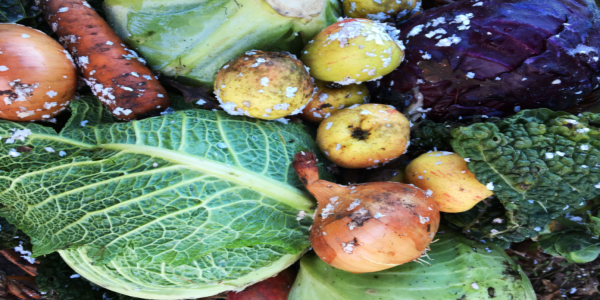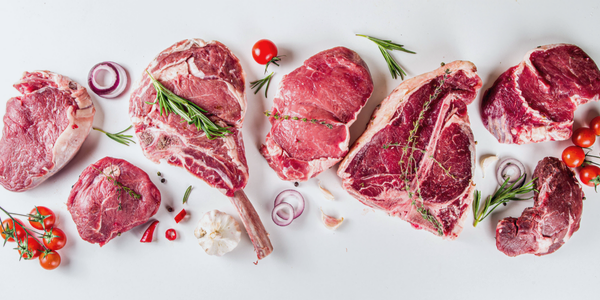
Cold weather produce is known for being hardy. However, winter produce is also known for its health benefits. From side dishes to the main dish, winter fruits and vegetables are versatile and full of vitamins and minerals.
Keep reading for the ultimate winter produce guide, including winter season vegetables you shouldn’t skip out on.
What Produce Is In Season In Winter?
Curious about what to eat all winter long? Many people experience cold weather during winter, making it seem like an unfruitful season. However, several seasonal fruits and vegetables reach their nutritional peak during winter.
Here are a few fruits and vegetables you may be able to find during the winter season at the supermarket.
Winter Fruits
• Apples
• Avocados
• Bananas
• Citrus (i.e. lemons, limes, oranges)
• Grapefruit
• Kiwifruit
• Pears
• Pineapples
Winter Vegetables
• Beets
• Brussels sprouts
• Cabbage
• Carrots
• Celery and celery root (celeriac)
• Collard greens
• Kale
• Leeks
• Onions
• Parsnips
• Potatoes, sweet potatoes, and yams
• Pumpkin
• Rutabagas
• Swiss chard
• Turnips
• Winter squash (i.e. acorn, butternut, delicata, spaghetti)
15 Healthiest Winter Fruits And Vegetables
With so many options to choose from, are you wondering what makes the best winter produce list? Look no further than these 15 fruits and veggies.
Grapefruit
Grapefruit is a larger citrus loaded with vitamin C and vitamin A (which have antioxidant properties), and minerals like magnesium and potassium. Additionally, grapefruit can provide dietary fiber and hydration to the diet. From breakfasts to honey-sweetened desserts, this versatile fruit is both nutritious and delicious.
While it is known for its potential in lowering cholesterol and blood pressure, keep in mind that some medications may have a negative interaction with grapefruit or grapefruit juice. Be sure to check your medication labels or check in with your doctor, especially if you’re taking cholesterol or blood pressure medications.
Blood Orange
Blood oranges get their name from pigments known as anthocyanins in the flesh of the fruit. Anthocyanins not only give blood oranges their reddish-orange hue, but are linked to numerous health benefits. In addition to giving winter drinks and dishes a fun pop of color, blood oranges boost potassium, vitamin C, and folate.
Pears
With a whopping 5 grams of fiber per serving, pears provide needed nutrients to the diet. Pears contain prebiotics, a specific type of fiber that feeds “good” bacteria in the gut. Since the gut is influential in immune function, eating pears in the winter can help support your health.
Kiwi Fruit
Kiwi is another fruit teeming with vitamin C. Just one kiwi fruit can provide around 60-75% of your recommended daily amount. In addition, kiwis contain vitamin K which is essential to blood health.
Butternut Squash
Butternut squash is just one of many wonderful winter squashes. Rich in vitamin A, butternut squashes may help improve immunity and promote heart health. In addition, butternut squashes can help add dietary fiber to the diet, which is key to balancing blood sugar. Combine it with cauliflower and chickpeas for a nutrient-dense recipe.
Pumpkin
Not just popular in the fall, pumpkins provide nutrients like vitamins A, C, D, and riboflavin to the diet. Pumpkins also add fiber and minerals to the diet. From porch decorations to shelf-stable canned pumpkin in the pantry, pumpkin is a versatile ingredient you can put to good use in the winter. Try it in everything from smoothies to soups to stews. Alternatively, try wedges with a spicy twist.
Kale
Leafy greens also make the list of top winter vegetables. From salads to sauteed dishes, kale can add plenty of potassium to your main meal or side dish. Kale can also be crucial for certain populations, like pregnant women, since it is a great source of folate.
Collard Greens
Another leafy green known for being a nutritional powerhouse is collard greens. It’s naturally cholesterol free, low in fat, and a good source of fiber. Collard greens are also a source of plant protein.
Swiss Chard
Yet another leafy green loved for being colorful and cholesterol free is swiss chard. It’s high in antioxidants, namely vitamins A and C. It’s also a good source of copper and magnesium. Additionally, it’s been associated with lowering the risk of cancer.
Brussels Sprouts
Hardy vegetables like Brussel sprouts are known for their nutrient density. Often ignored due to their distinct taste, when seasoned well and cooked correctly Brussels sprouts offer numerous nutrients. Namely, vitamins B6, C, and K are present, as well as minerals like manganese and potassium.
Cabbage
Cabbage makes most winter vegetable lists due to the many compounds that make it health-promoting. It’s chock full of nutrients, including phytochemicals, antioxidants, and anthocyanins. Additionally, the cruciferous vegetable has been linked to reducing the risk of heart disease and cancer. You can also enjoy it in its fermented form (sauerkraut).
Beets
Along with their unique color, beets contain nutrients like folate and beta carotene (the precursor to vitamin A). They are perfect for adding a festive flair to holiday dips and are considered a staple for winter salads and soups. Plus, they can be pickled!
Carrots
While carrots can be enjoyed all year long, they are perfect for plumping up soups and stews in the fall. Although they are known for their beta carotene content, carrots also contain antioxidants that can lower the risk of chronic disease.
Sweet Potatoes
A ravishing root vegetable, sweet potatoes are a great source of fiber. Plus, they are packed with vitamins and minerals like vitamin A and potassium. They add a sweet flavor to everything from baby food to Thanksgiving side dishes. You can also hide them in everything from mac and cheese to brownies!
Celery
From the stalk (celery) to the root (celeriac), this vegetable contains antioxidants, fiber, and even calcium. Celeriac may seem intimidating at first, but it's actually easy to prepare once peeled. Try incorporating it in salads, stews, and slaws.
Winter Seasonal Herbs
As temperatures drop, several herbs also come into season. Great for seasoning stir fries, soups, and more, herbs and spices can create a cozy concoction. Parsley in particular can withstand cold temperatures, making it perfect for at-home winter gardens.
A Final Word On Winter Seasonal Ingredients & Produce
Seasonal winter produce can perk up any cold weather meal. Pick health-promoting fruits and vegetables to add to your plate, including produce rich immunity-boosting vitamin C. Improve your wellness in the winter by choosing delicious and nutritious foods
References:
Ballis S. What Is Celeriac and How Do I Use It? Eatingwell.com. Published August 2022.
Collins K, Ellis E. Winter Foods for Kids. Eatright.org. Published December 2021.
Dolson L. Collard Greens Nutrition Facts and Health Benefits. Verywellfit.com. Published June 2022.
Gardner A. 15 Health Benefits of Grapefruit, According to Nutritionists. Health.com. Published October 7, 2022.
Kennedy K. The 8 Best Winter Fruits to Help Keep You Healthy. Everydayhealth.com. Published December 2020.
Kubula J. The 10 Healthiest Winter Vegetables. Healthline.com. Published November 2017.
Marincovich A. Winter Fruit and Vegetable Guide. Therealisticdietitian.com. Published December 2020.
Meeks S. Sweet, Sweet Citrus: 5 Health Benefits of Blood Oranges. Greatist.com. Published December 2021.
Palmer S. Winter Vegetables. Todaysdietitian.com. Published November 2018.
Produce for Better Health Foundation. Swiss Chard. Fruitsandveggies.org. Accessed 2022.
Sass C. 20 Fruits and Vegetables That Can Benefit Your Health This Winter, According to a Nutritionist. Health.com. Published December 2021.
USA Pears. Gut Health. Usapears.org. Accessed 2022.
USDA SNAP-Ed Connection. Seasonal Produce Guide. Snapped.fns.usda.gov. Accessed 2022.







